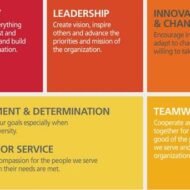Posted by Managementguru in Business Management, Entrepreneurship, Human Resource, Organisational behaviour, Principles of Management, Training & Development
on Mar 30th, 2014 | 0 comments

Values and Beliefs in Organizations What are Values and Beliefs in an Organization: An organisational value is “a belief that a specific mode of conduct is preferable to an opposite or contrary mode of conduct.” Infosys Narayanamoorthy on Value System : Our team was unique in our commitment to a strong value system. We believed in putting the interest of the company ahead of our own interest. We believed in legal and ethical business. A sound value system is what differentiates long-term players from others. Core Values of an Organization: Increasingly, organizations are setting out the core values that they think should govern the behavior of all their employees. Value statements may be produced which define core values in areas such as: Care for customers Concern for people Competitiveness Enterprising Excellence Flexibility Growth as a major objective Innovation Market/customer orientation Productivity Quality Teamwork But, is that all? By just defining what you think is important to guide the action of your employees may not suffice the cause. How do you put them into action! That’s where the secret lies. Imitating the Boss: How do you make people do what you want them to do! Just by being a precedence or role model for your followers, is that not true? The best example that can be cited is the school atmosphere, where the kids take to their teachers. They simply, blindly follow or imitate whatever their masters do. I think IMITATION is the right word, because it makes people easily inclined to the behavior that is appreciated by the organisation’s atmosphere. When you imitate your boss you get a surreal feeling of being a boss at least for that time being. Coercion is not the Right Approach: It is a general fact that it is very difficult to train or mould people the way we want to. And again it can be argued that people can be trained or molded very easily when you have the right kind of motivation and guidance. The core values should be INBUILT; it should be there RIGHT FROM THE START. If you have able managers to run your teams it becomes a cake walk for you to train the individuals without much COERCION. The authority and influence which the team leader has over the team says it all. Influencing the Employees the Right Way: Everybody in an organization plays their own role in cherishing the values imbibed and focus on achieving results, and keenness to “GET GOING AND KEEP GOING”. High work output is expected from a clerical staff, the Supervisor can be depended on for effective organization and control of teams and their work. THE MANAGER is clear about what “success “means for the business and is resourceful in overcoming obstacles. THE SENIOR MANAGER maintains focus on the “BOTTOM LINE” despite continuous changes to procedures and systems, and the EXECUTIVE is focused on results even when dealing with very diverse complex tasks and proactive in tackling mistakes. Performance of Value Oriented Organizations: Value Oriented Organisations perform definitely better than others and achieve their targets in a quick manner. Values give direction to the firm backed up by solid principles to guide the action of the employees and also the commitment and determination to achieve whatever is due. Reliance Industries Limited stands as a testimony for a single man’s dream and vision and his core value was CUSTOMER SATISFACTION. To scale to greater heights, you also need STRONG WILLED PEOPLE RIGHT ATTITUDE ACTION PLANS STRATEGIES PERSISTENCE DETERMINATION and PASSION Values add integrity and honor to your organization and you should always remember that to hold your values you...

Posted by Managementguru in Decision Making, Entrepreneurship, Human Resource, Organisational behaviour, Principles of Management, Training & Development
on Mar 20th, 2014 | 0 comments

Self Motivation-Key to Managerial Success What is Self Motivation : Ability to do what needs to be done without external influence. How does your company become successful? Just because you have cutting edge technology! Surplus capital! Excellent Infrastructure! Reliable Workforce! Definitely not. A COMPETENT VALUE-DRIVEN CORPORATE MANAGER would make all the difference. Even his very presence would make the atmosphere ELECTRIC. Only some are gifted or bestowed with top managerial qualities. How! Is it an innate quality or imbibed! It is a topic worth the discussion, because it proves to be the liveliest element in the management process. Well, when top management decides to recruit a good manger, what are the qualities they would be in favor of? Think about it, we even expect a house maid to be sincere, on time and loyal to us. When it comes to corporate dealings, the first and foremost quality desired will be “BEARING HUGE RESPONSIBILITY“. Accountability, transparency and control towards the day to day affairs of the company follow suit. Read this resourceful article from Inlpcenter – Change Your Thinking: The Alternate Futures Self-Motivation Exercise , a unique self motivating strategy to make believe in yourself and become better problem solvers. These managers who are also leaders serve as a ROLE MODEL for all the other employees SET STANDARDS FOR PERFORMANCE Motivate their employees Set a Brand Image for the company Be a GOOD LIAISON Problem solver Counselor and make the company special. Strategic Direction: When we talk about value, we talk about the influence that the value has on the STRATEGIC DIRECTION OF THE FIRM, which involves shaping up the character and image of the firm. A good manager EVOLVES OVER A PERIOD OF TIME. While considering the HEAVY TURN OVER TREND that has set in lately in the corporate environment, it becomes important for the top management to pick their HR lot carefully. How do you empower your trusted persons is a question that every Boss has to ask himself to retain the best talent. Good Managers stick to the firm and they contribute to the GROWTH OF THE FIRM. Training plays, of course a major part in the DEVELOPMENT OF MANAGERS but I feel that ONLY THE PERSON WHO MAKES THE BEST USE OF HIS SUBCONSCIOUS INNER DRIVE, REACHES THE TOP. Loyalty is an outdated term in this modern world and the minimum you could expect is SINCERITY. Self motivated managers easily regulate the environment and makes the climate cordial. He has to don many roles, A BRIDGE BETWEEN TOP MANAGEMENT AND EMPLOYEES MANAGE THE INTEREST(OF BOTH THE FINANCIAL INSTITUTIONS AND EMPLOYEES) FORMULATING MARKET STRATEGIES SHOULD BE A TECH-SAVVY A MAN OF EMPATHY A MAN OF BRILLIANT INTUITIONS(ESPECIALLY WHEN IT CONCERNS STOCK MARKET) EVER LEARNING VERSATILE and much more. Practice makes a man perfect is the saying. It suits the corporate business world too, provided the man is intelligent, capable and smart in taking decisions. Always a thinking person, an efficient manager would be on the look out for opportunities and resources that could benefit the firm. Every one of you who aspires to catch up with top positions in the business world must do a “THOROUGH SELF ANALYSIS” as to how agreeable you are in the likert scale of the...

Posted by Managementguru in Decision Making, Entrepreneurship, Human Resource, Principles of Management
on Mar 20th, 2014 | 0 comments

How Women Entrepreneurs are Viewed by the Society An entrepreneur is one person who has the ability to think out of the box, to cash in on the opportunities, to think big and different, to go for innovative ideas, to take warranted risks and to make a difference amongst the ordinary lot. Modern business world and the society as a whole have understood the importance of women emerging as successful and powerful entrepreneurs which has proven good for the growth of a country’s economy. Challenges of being a woman: The challenges start at the grass root level: being a woman is sufficient enough to create a gender bias and to be looked down. Physically the differences are obvious and the strength that a man is empowered with cannot be overruled, but the inner strength and the power to conquer that a woman is empowered with can never be equaled. Running a household is even more difficult than running a corporate business. All your management principles come under the household umbrella. No tactics or strategy is left unturned for the smooth running of the household. A woman needs no training in areas of strategic planning decision making(comes naturally) developing interpersonal relationship delegating authority decentralization managing leadership motivating others and self motivation crisis management impression management quality of work Women CEO’s add Value to their Companies: Nature has blessed her with all these and many more managerial qualities that are needed to manage an organization effectively and efficiently. Gone are the days when they were treated a step down, now most of the corporates have very efficient women CEO’s and their ability is reflected in terms of productivity and profitability. Moreover a woman adds value to the company as responsibility is her second name and this works out in favor of the organization to gain the trust and confidence of its consumers, suppliers and stake holders. A woman can occupy any post of its highest kind including the presidential or prime ministerial positions. The enthusiasm that a woman entrepreneur exuberates is infectious and induces positive vibes in the organization. Be it negotiations, tackling the union leaders and workers, business travels or bargaining, nothing is a problem. She is more efficient in clinching deals and proves adventurous in concluding new business ventures. Work – Life Balance: A woman has to have a balance between her family, relationships, children and work. That is the biggest ever challenge which she handles with ease. The financial pinch that the recent economy has created has served as an eye opener for men in realizing the fact that a house needs two financial paymasters for running the show. Success Ratio of Women Entrepreneurs: Many few women entrepreneurs emerge out as victors as most of them lack support from their counterparts and lack of financial support from banks, financial institutions may also slacken the pace and hinder their progress. The success ratio has considerably increased when compared to olden days but still many of them lack the nerve to start their own business. Ignorance and lack of self reliance are the major factors hindering the development of female entrepreneurs. I have seen many women who are born in business families with natural business instinct and their added advantage would be the already available infrastructure, platform and guidance to grow and make it to the top. Even circumstances force certain women to go in for self owned business and once they taste the essence of success they never want to look back. The society has a bigger role to play in developing more women entrepreneurs by giving positive support. Women have a better judgement on role analysis and perception which turn them into better role models in any field or...

Posted by Managementguru in Human Resource, Motivation, Organisational behaviour, Principles of Management, Training & Development
on Mar 18th, 2014 | 0 comments

Promoting Effective Communication in the Work Place A purpose or an idea to be conveyed is needed for communication to happen. The question is how well or how successful you are in transmitting the message (mind you! without transforming it) to the receiver in the proposed meaning, whatever the channel might be! Communication must serve the following functions… Effective Control Motivational expression Information Fundamentally communication helps in controlling the behavior of the members of an organization in several ways. Either formal or informal, it controls the activities of the employees by prescribing certain procedures of communication to be followed when there is a grievance or a difficulty regarding his/her job, the work situation etc. Communication provides Vital Information: Communication also motivates people by clarifying what needs to be done, how to be done and how they are performing and what can be done to improve their performance. Most important function is that communication provides vital information that is crucial for members at all spans or levels to make effective decisions. The feelings of members are also articulated as grapevine in an organization, and in a way it serves as an outlet for their emotional expression. Grapevines: Grapevines are always not harmful, they might even give you information about the pulse of people working for you and if you are really sharp, “you can work it out to your advantage. Communication is always referred to as “oxygen”, we can feel only when it breaks down. Communication plays an important role in managerial and organizational effectiveness. Nevertheless, on the other side it can be the root cause of all the problems in your organization. This excellent infographic on Business Etiquette and Body Language Blunders clearly indicates how body language and gestures influence communication to a greater level. Source: www.thewebsitegroup.uk Effective Communication: In general, effective communication is the prerequisite for any healthy organization and the attainment of its standard objectives. Most of us are in fact aware of how our vocabulary has been modified to reflect political correctness. For instance we have replaced certain words like handicapped, blind and elderly by physically challenged, visually impaired and senior. One must be sensitive to others feelings. Words are the primary means by which people communicate; so due importance must be given for politically correct words both in the society at a larger level and in firms at the micro level. Increasingly, I find people like being addressed by their designation capacities. Even people might get offended if you call them by their first names as it is regarded to be disrespectful. But I think it is always better to address a person giving due respect to his position if you are reporting to him. That way there is no scope for conflicts and strained relationships. Western countries are more modern in their outlook and have a broader perspective on human interactions than the east. Gestures: Words mean different things to different people. In organizations, people of different background work together, so they have their own language of expressing their opinions and ideas. So it calls for a uniformity of language that is well understood and appreciated by all. Gestures also play their part in communicating ideas. So self controlled expressions, proper behavior are also necessary that completes a communication process. Ultimately proper communication leads to… Satisfied employees Effective feedback Organisational efficiency Freedom for suggesting ideas Enhanced interpersonal relationships Closely knit organisational network Encouraging trust and openness. Communication is an on-going process and the purpose is “not to dictate but to make the employees understand the big picture” as to how the process imparts success and viability to the...

Posted by Managementguru in Business Management, Marketing, Operations Management, Principles of Management, Strategy
on Mar 16th, 2014 | 0 comments

Game theory and strategy What is Game Theory: Set of concepts designed for decision making in situations of competition and conflict under specified rules. The prisoner’s dilemma: The prisoner’s dilemma is a canonical example of a game, analyzed in game theory that explains why two individuals might not cooperate, even if it appears that it is in their best interest to do so; Albert W. Tucker formalized the game with prison sentence payoffs and gave it the “prisoner’s dilemma” name. To solve many practical problems that are encountered in economic, military or other disciplines, one has to deal with situations in which there are two or more conflicting parties striving for the same objective and the outcome of each action of one party depends solely on the opposite parties choice of a course of action. As we all know only one horse can win the race ultimately and the other parties only can prolong the race or see to that they make every possible move to delay the opponent’s success. So, what’s this game theory all about? This is a special mathematical method that was evolved mainly to analyze conflict situations where the number of competitors is finite, each participant has a definite set of actions to choose and there is a conflict of interest between the competitors. So it helped the participants to reach a decision that would put them in the winning post. This theory has spilled its implications on business situations where success is the motto and conflict and competition the order of the day. Only the best among the best survive. Darwin’s theory, “Survival of the fittest” applies not only to biological organisms but also to business organizations which are also abuzz with activity. Chance Moves: Games like chess, checkers are played according to a definite set of rules laid down and these game patterns has inspired business persons to introduce strategies in business, where the concentration is mainly focused on the chance moves that defeats the opponent. Big business corporates mainly concentrate on the strengths and weaknesses of their competitors to have an edge over them. A real game is controlled and regulated by the statutory rules to be followed but a business game involves lot of killer instincts and intuitions combined with rational thinking and logic. Optimal Strategy: The first party always puts himself in the shoes of the other party and tries to perceive how the other party would react in a particular situation. Although the aim is to win, choosing the optimal strategy is what matters. It will at least keep you in bay. Precise solutions can be arrived at if you plan your game fittingly. The anticipation and thrill that is involved in a strategic game is matchless. We witness a lot of firms imitating what the leader of the market does. The risk is borne solely by the firm introducing the change and the firm takes the major share of profit as it is the pioneer and if it loses the next strategic move is planned for. For a company with sound financial position, the chance move is worth giving a try, head or tail doesn’t matter. The stalkers are benefited by the waiting period during which they come to know of the pros and cons of the strategy employed by the leader. Games are played in the true spirit of sportsmanship, but a business faces cut throat competition. There is no space for any courtesy or liberal approach. If you are quick enough to pick the pulse of the people by gauging their preferences, analyzing the market conditions and employing timely strategies you will at...










